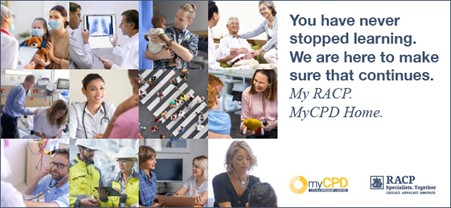AFOEM eBulletin - 10 February 2023
Welcome to 2023 and I hope that you've all had an opportunity to rest and recuperate over the holiday season. The priorities for the year for our Faculty continue to be training, resources, and increasing our presence and influence in organisations to improve the health and well-being of workers.
With respect to training, we welcome the support of our new CEO, Louise McElvogue, to provide resources for our ATM. The Faculty executive has decided to proceed with the ATM in Brisbane. The dates are yet to be finalised between the QLD Training Program Director, Kalesh Seevnarain, and RACP staff, but the ATM is anticipated to be held around May.
I had the pleasure of participating in a NSW training meeting last week which was well-led by Peter Yu and supported with expert comments from Tim Driscoll. Sheila Uyirwoth compared the implementation of safety management systems in Uganda with ISO standards. Mariam Iftikhar provided a case of silicosis in an asymptomatic engineered stone worker, while Nicolette Halin presented on pregnancy in the workplace with the example of pregnant embalmers in the funeral industry. Such high-quality presentations bode well for our future Fellows.
This meeting reminded me that Council members from several jurisdictions have raised the need for more supervisors and better support for supervisors.
I am aware that many of our Fellows have significant commitments but being a supervisor is a way of thanking those who have given their support to you during your training. Our trainees need and value the knowledge and experience of our Fellows. I know some Fellows are reluctant to become supervisors because of concerns that their knowledge may be confined to specific areas of interest. However, being a supervisor is a way of refreshing knowledge and staying up-to-date with the latest advances in occupational medicine.
I would also like to see the situation where becoming a supervisor becomes part of our culture for new Fellows. It's a good way of refreshing knowledge and passing on practical workplace experience and exam technique. Our Fellows, no matter how recently the award of their fellowship, should be eminently suitable as supervisors.
Becoming a supervisor is an opportunity to assist the future of our specialty.
Finally, EOIs have been released for a Lead Fellow in Environmental Medicine and a Victorian representative for AFOEM Council. There are new EOIs on the ROC for a Stage B practical exam co-ordinator and for an Aotearoa New Zealand representative on our Policy and Advocacy Committee.
Being a supervisor or committee member provides opportunities to help satisfy the new CPD requirements for peer review. So I would strongly encourage our Fellows to consider giving back the support which may have been provided to them.
Dr Warren Harrex
AFOEM President
AFOEM examinations – opening soon
Applications for all eligible trainees (who have met the training program requirements) for the September and November 2023 examinations will open on Monday, 1 May 2023. Find out more.
During the month of February, we continue our popular webinar series featuring high profile speakers and educational opportunities, which are free for AFOEM Fellows and trainees. Register and find out more.

ANZSOM, in conjunction with AFOEM as Scientific Program Partner, is pleased to announce that the conference website is now live. A call for papers will open shortly. For more information, visit ANZSOM ASM 2023.

Last year we notified you that your Continuing Professional Development (CPD) requirements will be evolving. This is a reminder that as of 1 January 2023, all Australian medical practitioners will need to select a CPD Home.
Did you know that your RACP Fellowship means you already belong to a quality and accredited CPD Home? There are plenty of benefits, resources, and tailored support available to you as part of your College membership.
Remember to also review the 2023 MyCPD Framework webpage for a breakdown of other changes which have taken effect as of 1 January 2023.
Learn more.

If not, can you please take a couple of minutes to complete it? All you need to do is log in to My RACP, click ‘update my work profile’ and answer a few questions about your work activities.
By completing your 'my work profile' you will provide us with valuable insights which we can use to make evidence-based and informed advocacy decisions for improving workforce planning.

The ROC is a secure online forum for all RACP Fellows and trainees, designed to support your needs through a range of innovative programs such as:
Mentor Match which helps you connect with other members based on your mentoring preferences and professional goals. Mentors provide guidance and support to mentees, while mentees are given the opportunity to develop personally and professionally and receive constructive feedback to improve performance and outcomes. This activity falls under the MyCPD Category 2 – Reviewing Performance.
The ROC mobile app will help you get the most out of your online community and connect with other RACP members. The app can be used to initiate discussions, find other members, read the latest posts and share your expertise. Download the app from the App Store or Google Play, or log in via MyRACP.
IMJ On-Air podcast – High readmission rates in cirrhotic patients

Ep4: High readmission rates in cirrhotic patients
Hospitalisation rates for cirrhosis are increasing in Australia, in part associated with the high prevalence of obesity and subsequent non-alcoholic fatty liver disease. More concerning is the frequency with which discharged patients are readmitted within 30 days. One systematic review put the average readmission rate at 26 per cent, but the studies cited varied greatly in their inclusion and exclusion criteria, and not much is known from Australia and Aotearoa New Zealand.
In the December edition of the Internal Medicine Journal, researchers at the Austin Hospital Liver Transplant Unit in Melbourne reported a 46 per cent readmission rate among their patients. This was based on a retrospective audit of medical records, which also suggested that a fifth of readmissions might have been preventable. Better adherence to practice guidelines when patients are first hospitalised for cirrhosis may reduce a significant burden on patients and the healthcare system.
Guests
- Professor James O’Beirne FRCP FRACP (Director of Gastroenterology & Hepatology, Sunshine Coast Hospital and Health Service; University of the Sunshine Coast)
- Dr Karl Vaz FRACP (Victorian Liver Transplant Unit, Austin Hospital)
Key Reference
Karl Vaz et al. Rate of early hospital readmission amongst cirrhotic patients is high in Australia: experience from a single liver transplant centre Internal Medicine Journal 2021; 52(12)

Ep5: Hyperglycaemia and COVID-19
In the first year of the COVID-19 pandemic, a handful of international studies showed that there was increased risk of adverse outcomes in hospitalised patients comorbid for diabetes. Odds ratios for mortality conferred by pre-existing diabetes ranged from 1.5 to 3.6. What this relationship might be in Australia was not known until researchers in Melbourne retrospectively examined electronic medical records from the two waves of COVID-19 in that city.
The prevalence of diabetes among Melbourne inpatients is around 35 per cent, and in 2020 over 70 per cent of all Australia’s case load was in Victoria. This presented an opportunity to observe the relationship between the conditions with substantial statistical power. But while ICU admission and mortality were more common in those with diabetes than those without, neither diabetes nor hyperglycaemia were independently associated with in-hospital mortality.
In this podcast the authors speculate as to why there was this deviation from patterns observed internationally. A possible explanation involves the receipt of dexamethasone therapy in patients with hyperglycaemia, which was found by other researchers to be preventative for COVID-19-associated mortality.
Guests
- Associate Professor John Wentworth FRACP (Royal Melbourne Hospital, Walter and Eliza Hall Institute)
- Dr Rahul Barmanray FRACP (Royal Melbourne Hospital, the University of Melbourne)
- Dr Dev Kevat FRACP (Western Health, Monash University)
- Dr Mohamed Ashraful Islam (Goulburn Valley Health)
Free access to IMJ for RACP members.

This Valentine’s Day, your Member Advantage brings you incredible discounts at retailers including JB HiFi, Temple & Webster, The Iconic, Michael Hill and more! For a limited time only, save 14 per cent on Ultimate Beauty & Spa, Ultimate Him and Ultimate Style/Shopping eGift cards, as well as Gourmet Traveller Restaurant eGift cards*. Available online, 24/7. That's your Member Advantage.
*Terms & Conditions apply.
Member Advantage Australia
Member Advantage Aotearoa New Zealand
The Royal Australasian College of Physicians publishes notices of events and courses as a service to members. Such publication does not constitute endorsement or mandating of any such events or courses.
Go to the
events list at any time to see what events are coming up.
AFOEM contact details
AFOEM Faculty enquiries (including Council and committees):
LynFay Shapiro
AFOEM Executive Officer
Email: afoem@racp.edu.au
AFOEM Education and Training enquiries:
Education Officer
Phone: +61 2 8247 6268
Email: occenvmed@racp.edu.au
AFOEM Examination enquiries:
Examination Coordinator, Assessment Services
Email: faculty.examinations@racp.edu.au
AFOEM training site accreditation inquiries:
Site Accreditation Unit
Email: accreditation@racp.edu.au
AFOEM CPD enquiries:
Email: mycpd@racp.edu.au